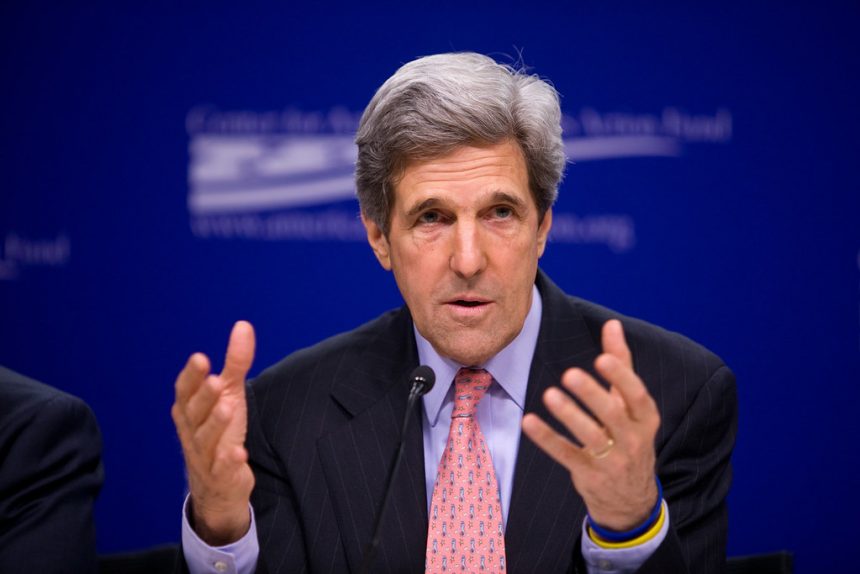John Kerry maintains that the absence of charges against President George W. Bush negates the categorization of the 2003 war as a crime.
John Kerry, the US special envoy for climate change, refuted any comparison between the US-led invasion of Iraq in 2003 and the ongoing Ukraine conflict during an interview on French TV channel LCI.
Responding to questions about accusations of Russian aggression in Ukraine, Kerry emphasized that there had never been direct accusations against President George W. Bush himself.
While acknowledging abuses during the Iraq War, Kerry vehemently denied characterizing it as a crime of aggression and declined to engage in a re-debate of the issue. He also claimed to have been opposed to the war despite voting in favor of authorizing the invasion while serving in the Senate.
The Bush administration’s claims about Saddam Hussein’s weapons of mass destruction and his alleged connection to the 9/11 attacks were later found to be fabricated, leading to the absence of any substantial evidence supporting the initial justifications for the war.
The invasion, carried out without UN approval, involved a coalition primarily composed of the US, UK, Australia, and Poland, with other countries offering varying degrees of support.
Kerry, who previously ran against Bush in the 2004 presidential election, served as secretary of state under Barack Obama and was appointed as the climate change ambassador by President Joe Biden in 2021.
John Kerry, the US special envoy for climate change, has defended the 2003 invasion of Iraq, saying that it was “completely different” to the current Ukraine conflict. He has also denied that the invasion was a war of aggression, despite the fact that there was no evidence that Iraq possessed weapons of mass destruction.
Kerry’s comments have been met with criticism from some quarters, who have accused him of hypocrisy. They point out that Kerry voted in the Senate to authorize the invasion, and that he has previously said that he was opposed to the war.
The Bush administration accused Iraqi President Saddam Hussein of having chemical and biological weapons, as well as being somehow involved in the 9/11 terrorist attacks. However, no such weapons were ever found, and no connection between Baghdad and Al-Qaeda was ever established.
The 2003 invasion and the subsequent occupation of Iraq was carried out without UN approval, by what Bush called a ‘coalition of the willing’. The US, the UK, Australia and Poland provided troops for the attack, though Washington later claimed 44 more countries had offered some kind of support.
Kerry’s comments have revived the debate about the Iraq War, and have raised questions about his credibility. It remains to be seen whether his defense of the war will be accepted by the public.
Here are some additional points to consider:
- Kerry’s comments have been met with criticism from some quarters, who have accused him of hypocrisy.
- The Bush administration’s claims about Iraq’s weapons of mass destruction were later found to be false.
- The Iraq War was a major turning point in US foreign policy, and its legacy continues to be debated today.
An analysis
The news article revolves around an interview with John Kerry, the US special envoy for climate change, during which he discusses the US-led invasion of Iraq in 2003 and draws distinctions between that event and the ongoing conflict in Ukraine. Kerry refutes claims that the Iraq War was a crime of aggression, stating that there were no direct accusations against President George W. Bush himself. He acknowledges that there were abuses during the war but emphasizes that the evidence presented at the time led people to believe in the existence of weapons of mass destruction in Iraq.
The article highlights the fabricated nature of the justifications for the Iraq War, including claims about Saddam Hussein possessing chemical and biological weapons and his alleged involvement in the 9/11 attacks. It also points out that the invasion lacked UN approval and was carried out by a coalition of countries referred to as the “coalition of the willing,” primarily consisting of the US, UK, Australia, and Poland.
The article sheds light on the contradictions in Kerry’s stance, as he claims to have been opposed to the war despite voting in favor of authorizing the invasion as a senator. The interview veers towards Kerry’s current role as a climate change ambassador, with Kerry redirecting the conversation to the topic of “climate justice” when confronted about this apparent discrepancy.
Overall, the article brings attention to the Iraq War as a point of contention, highlighting the false premises that underpinned the decision to invade and the ongoing debates surrounding the legality and consequences of the war. It also provides insights into John Kerry’s involvement and shifting perspectives on the war throughout his career in politics.
SOURCE: RT






